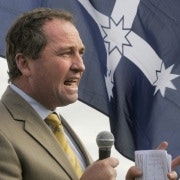How Labor might look when the smoke of battle clears
When governments fall apart, they usually do so spectacularly.
The gold standard of recent times remains the bizarre behaviour of John Howard and his cabinet in 2007, when the APEC meeting in Fortress Sydney became the backdrop to Howard inviting his cabinet to off him because he was leading them over a cliff. His cabinet collectively bottled it.
For all the shenanigans within Labor in recent months, they haven't yet reached the point where Julia Gillard has gone to the knife drawer and asked her colleagues which blade they'd like to use, only to be told to put the silverware away. Still, 2007 is more than five minutes ago and few journalists remember longer than that around here.
Instead, a collective sense of resignation has settled over most of Labor, with the only real debate being whether the defeat will merely be consistent with the polls – i.e. losing 15-20 seats – or whether there's a darker mood in the electorate not being picked up by pollsters, one that will see Labor destroyed.
Nor is this new. Labor MP Alan Griffin has been telling colleagues for weeks that he doesn't expect to retain his seat, which given his 8-point margin suggests the apocalyptic scenario rather than the merely disastrous one. That would reflect not just the mass defection of swinging voters to the Liberals, but the defection of once-rusted-on Labor voters, even party members, angered at the ALP's seeming loss of direction.
Despite that, Gillard has forged ahead, sticking to the game plan, concentrating on education funding reforms and austerity as the two Labor re-election tactics, since Tony Abbott has taken NDIS out of that particular picture. There's a prime ministerial silhouette against what appears to be an oncoming storm of frightening magnitude.
Occasionally, it seems even she momentarily succumbs to the sense of despondency that most of caucus now has. Right near the end of question time yesterday, after an hour of constant opposition questioning, the primary purpose of which seemed to be nothing more than to utter the phrase "convicted jihadi terrorist" as frequently as possible (and preferably pronouncing jihadi "jee-hardy"), Gillard lost her customary cool at the sight of frontbencher Christopher Pyne and Abbott laughing.
"The Leader of the Opposition is laughing now. Here is his big attack on national security –'Oh, it's so hard hitting!' He's such a serious man! He's prime ministerial material! And in the middle of a question time on national security he is laughing. It is just a game to you, isn't it? Your demeanour shows it. The fact you are laughing shows it. The fact that the shadow minister who asked the question is spending the answer looking up at the press gallery and laughing shows it. The chatter across the opposition shows it. It has been a game all week, and in this question it is transparently a game."
It was a brief moment when what must be an immense frustration at being unable to make a dent on Abbott's huge lead was revealed.
Thank goodness for Kevin Rudd, then, making what by his own prolific standards is now a rare media appearance last night, agreeing to join 7.30 if he could discuss the Obama-Xi summit. I wasn't aware the ABC agreed to conditional interviews, but in any event, we at least got some mature and interesting geopolitical analysis from Rudd, far beyond what we're used to getting from either Labor or Liberal frontbenchers. Rudd may have several fairly profound personality defects, but he does have a great depth of foreign policy understanding – certainly too much for his one-time department, Foreign Affairs, where they prefer ministers to keep their strategic ideas to themselves.
Even before Rudd had abandoned the line of never leading Labor again and retreated to his previous position that he'd never be challenging – indeed, he seemed to take a perverse pleasure in repeating that Gillard had thrashed him for the leadership in February 2012 – his ranging over China and regional issues served to contrast rather sharply not merely with his successor's communication difficulties but the whole tenor of politics at the moment. Which, undoubtedly, was partly the point.
Rudd's change of tack on leadership opens the door to him leading Labor, or the smoking ruins of it, after the election, something that would pose a far greater threat to an Abbott government than anyone else Labor hands the poisoned chalice too, given his strange but very great popularity with voters.
Better yet, it will give press gallery journalists the chance to speculate on Labor staging a last-minute rush to Rudd before the election. Normally they'd need no encouragement for leadership speculation, but when there's nothing else to talk about for 100 days except the looming victory of a rampant Coalition, it'll be impossible to avoid.
This story first appeared on www.crikey.com.au on June 7. Republished with permission.















